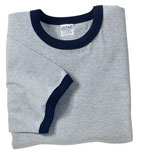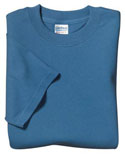The Ultimate Guide to T-Shirt Fabric
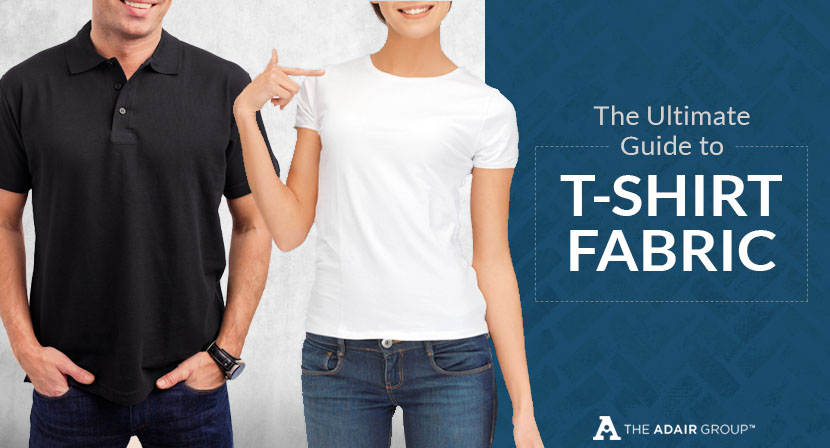
Whether you are looking to fill your own closet with brand-new shirts, searching for shirts to use for your organization or stocking up on tees for your business, one thing is for certain: There are a lot of options to choose from. While the most obvious choices you have to make involve color, style and size, there is something else that is equally important, though many people overlook it.
The fabric your t-shirts are made from matters just as much as the size and style. Unfortunately, though, it is something that a lot of people don’t really take into consideration or, at the very least, don’t pay as much attention to as they should. Whether you are shopping for yourself or for a business or organization, fabric makes a huge difference in terms of comfort, how easy the shirt is to care for and how well it works for things like screen printing. Certain materials are also better suited to some activities than others.
Each fabric type has its own pros and cons, and everyone has their own personal favorites. If you are shopping for blank t-shirts, this guide will help you choose shirts that are made from the fabric that best suits your needs.
Things to Consider When Shopping for Tees
Before we dive into the pros and cons of various types of fabrics, it’s important to make sure you have a clear idea of what you need. Taking a few things into consideration will give you a better idea of what qualities you should look for when buying t-shirts.
For starters, are you shopping for yourself, or are you buying t-shirts for a business or organization? If you are shopping for yourself, figuring out the right fabric could be as simple as checking the tags on your current shirts and buying new ones that are made from the same material. It’s a bit trickier, though, if you are shopping for others. Since everyone has different preferences, you need to find a fabric that will appeal to most people.
Also, think about when and how the shirt will be worn. If the shirts you buy are being used as giveaway items for a business or organization, you don’t necessarily need to buy ones that are appropriate for, say, wearing during an athletic event. Likewise, if you are looking for new t-shirts to wear when you go on your daily run, you will want to look for performance fabrics that will help keep you dry rather than absorbent ones that will weigh you down.
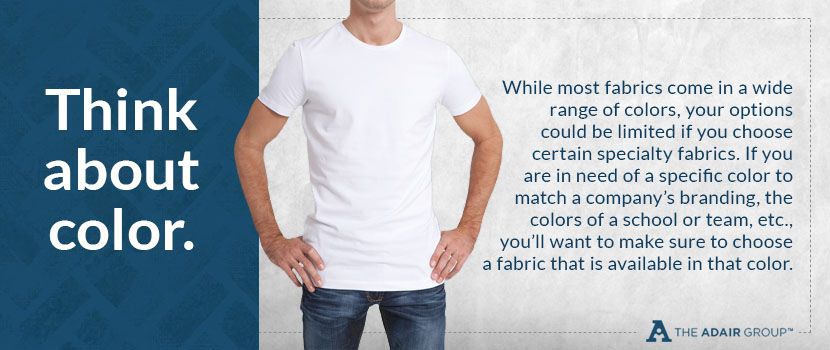
Think about color. While most fabrics come in a wide range of colors, your options could be limited if you choose certain specialty fabrics. If you are in need of a specific color to match a company’s branding, the colors of a school or team, etc., you’ll want to make sure to choose a fabric that is available in that color. Or, if the color is not available, you’ll want to find a fabric that can be easily dyed to the appropriate color.
If you are looking for blank shirts that you can customize by screen printing or with vinyl transfers, you’ll need a fabric that works well for these applications. Some fabrics work much better for these applications than others, so it’s important to choose one that is well-suited to your needs.
You might also want to consider the season during which the shirt will be worn, if relevant. This is important if, for example, you’re looking for shirts for your team to wear during summertime sporting events. When you choose the fabric based on the season, you’ll want to consider things like moisture-wicking properties, breathability, etc.
Lastly, think about comfort and durability. One of the great things about t-shirts is that they are comfortable and easy to wear and care for. Whether you are shopping for yourself or someone else, it is important to choose tees that are made from fabric that feels great against the skin and will hold up to frequent wear. Few things are worse than an uncomfortable t-shirt or a comfortable one that falls apart after just a few washes!
T-Shirt Fabric Options
While some options are more common than others, t-shirts can be made from a wide range of fabrics. Here are some of the most popular t-shirt materials and their pros and cons.
Cotton
Cotton t-shirts are, by far, the most common and popular option. This natural fiber feels great against the skin and is used to make the soft, lightweight tops that just about everyone loves. Cotton is ideal for casual, everyday wear. It’s important to note, though, that there are a few different types of cotton:
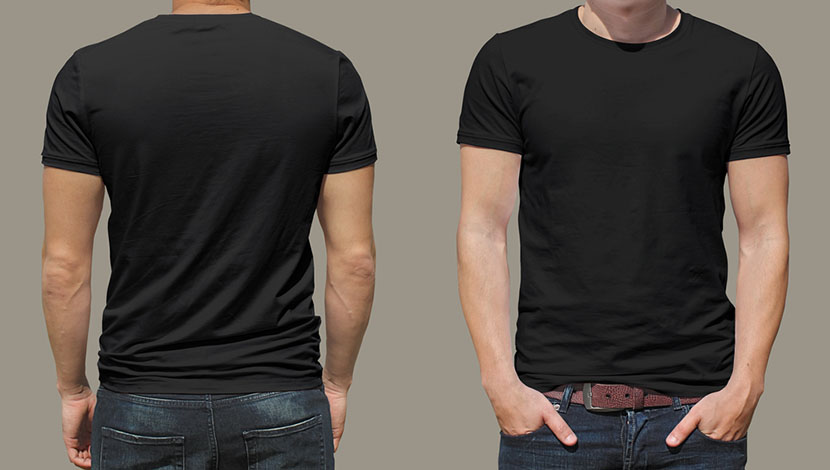
- Ringspun cotton is soft and durable. It is named for the process that is used to make it in which fibers are continuously spun, twisted and thinned to create incredibly long, soft strands.
- Combed cotton is made by eliminating short strands of the fiber and combing the remaining fibers straight. This results in a smooth, strong fabric that is one of the best materials for screen printing t-shirts.
- Pima cotton is the highest-quality cotton available. It has extra-long fibers that ensure softness, and it is durable. It is also one of the most expensive options.
- Organic cotton uses cotton that is grown without the use of pesticides or fertilizers. It is an environmentally friendly option that is soft and comfortable but costs more than regular cotton.
Cotton is a popular choice because it is a natural, renewable resource. It is soft, breathable and feels great against even the most sensitive skin. Manufacturing a 100 percent cotton t-shirt also requires fewer chemicals than manufacturing one made from synthetic materials, so shirts made from this material are regarded as a more environmentally friendly option, especially if you go with organic.
The downside is that cotton shirts can be more expensive than ones made from synthetic materials. And while a 100 percent ringspun cotton t-shirt feels great during normal wear, it’s not the best option when you plan on engaging in intense physical activity. Cotton is highly absorbent but doesn’t allow moisture to evaporate quickly. If you wear this fabric during an intense workout, it will quickly become weighed down by your perspiration and take a long time to dry.

Polyester
When you need a fabric that’s more appropriate for athletic wear, polyester is a good choice. Unlike cotton, polyester wicks moisture away from the skin and dries quickly, helping the wearer stay cool and comfortable. This synthetic fabric is also extremely durable and holds its shape without stretching.
Keep in mind, though, that polyester isn’t a particularly breathable material. A 100 percent polyester t-shirt will do a great job of pulling sweat away from your skin, but it may make you sweat more than a shirt made from another material simply because it doesn’t breathe. If you are concerned about your wardrobe’s environmental impact, it’s also important to note that polyester requires a lot of natural resources and chemicals to manufacture. And once it has reached the end of its lifespan, it takes a long time to break down in landfills and can leach chemicals into the environment.
Cotton/Polyester Blend
Shirts made from a cotton/polyester blend are great because they provide all of the benefits of both of these materials without the drawbacks. A 50 percent cotton/50 percent polyester t-shirt combines the softness and breathability of cotton with the wrinkle-resistance, durability and moisture-wicking properties of polyester. While 50/50 blends are the most common option, you can find cotton/poly blends in different percentages.
This fabric is an excellent choice that is suitable for virtually all applications. It is well-suited to screen printing and other customization methods, too. Cotton/poly blend t-shirts are appropriate for year-round wear and are, by far, one of the most versatile options. If you are searching for a t-shirt material with universal appeal, one that is made from a blend of cotton and polyester is likely your best bet.
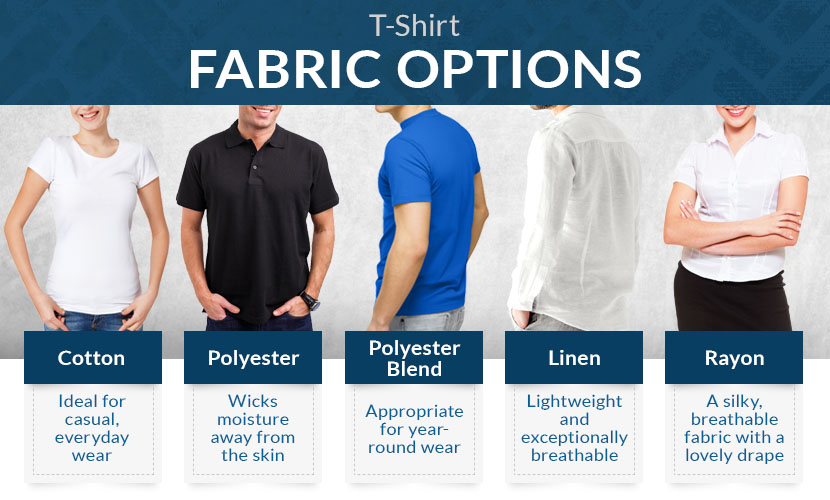
Linen
Linen is made from the flax plant and features a textured weave. It is lightweight and exceptionally breathable. It also does a great job of wicking moisture away from the skin and drying quickly, so it’s great for summer wear. It is not one of the most popular fabrics for t-shirts, though, because it tends to wrinkle easily. Linen shirts look great when they are properly cared for, but they aren’t necessarily the best option for casual wear.
Rayon
Rayon is a man-made fiber that is often used in athletic wear. Made from cotton, plants and trees, it is a silky, breathable fabric with a lovely drape. It’s also absorbent and accepts dye well. It wrinkles easily, though, so it isn’t used as frequently as polyester. It also tends to break down faster than many of the other fabrics on this list.
This fabric is, however, one of the components of tri-blend shirts, which usually consist of 50 percent polyester, 25 percent cotton and 25 percent rayon, though the exact percentages can vary. Tri-blend shirts are incredibly soft and work well for screen printing. Make note, though, that they tend to have a dappled appearance as opposed to the solid coloration of other materials.
Which T-Shirts Are Best?
When you are in the market for t-shirts, the options can be overwhelming. Keep in mind, though, that there isn’t necessarily one option that is “best” in all situations. It largely comes down to taking the time to understand various fabrics and their properties so that you can choose one that is well-suited to your particular needs.
If you are looking for the best material for screen printing t-shirts that will mostly be worn casually, cotton is a great option. If, however, you need shirts that will withstand a lot of wear and tear or help keep athletes cool and dry, you may want to consider polyester or a cotton/poly blend. Linen or rayon could be good options, too, depending on your specific needs.
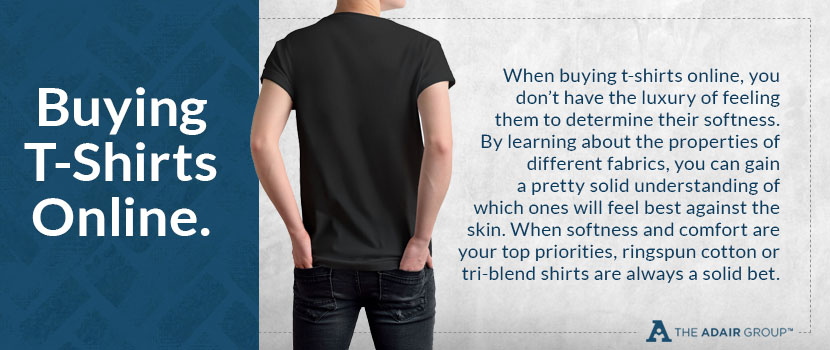
When buying t-shirts online, you don’t have the luxury of feeling them with your own hands to determine their softness. By learning about the properties of different fabrics, though, you can gain a pretty solid understanding of which ones will feel best against the skin. When softness and comfort are your top priorities, though, ringspun cotton or tri-blend shirts are always a solid bet.
Conclusion
It’s easy to think that all t-shirts are virtually the same, but that simply is not the case. In addition to coming in a never-ending array of styles, sizes and colors, they can also be made from a wide range of materials. In fact, they can be made from virtually any type of fabric. The ones mentioned in this article are the most common, though.
If you are in the market for new blank t-shirts for yourself or for a business or organization, considering your exact needs is an important first step in ensuring that you purchase the right ones. Take the time to review the information listed above when shopping to guarantee that the shirts you ultimately purchase will be perfectly suited to your needs.
At The Adair Group, we carry a wide range of t-shirts made from several popular fabrics. Whether you are looking for all-natural organic cotton tees, synthetic polyester shirts or something in between, we have exactly what you need. When shopping, keep comfort and durability in mind, and you will be well on your way to ordering your new favorite t-shirt!
